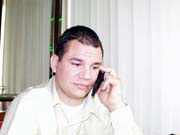Richard Rivera is an idealist. So much so that when he, as a police officer in West New York, noticed what he deemed “widespread corruption” in the Police Department, he went to the FBI and began gathering data to prove his accusations.
This may seem to be a good way to commit career suicide, and for Rivera, it was. Fired in 1996, Rivera has spent the last few years travelling nationally to conduct seminars about police misconduct and racial profiling.
Rivera applied to become a New Jersey State Trooper after his firing from the West New York Police Department in 1996. According to Rivera, “I was very discouraged when I noticed that someone had cheated on the physical exam and was given a free pass. I told someone and haven’t heard from them since.” Subsequent phone calls yielded nothing, he said.
A person who answered the phone at the New Jersey State Attorney General’s office and declined to be identified stated Tuesday, “I’ve seen a lot of people get passed over. I think a lot of it has to do with budget cuts. We’re probably going to have a [hiring] freeze soon.” Currently, the New Jersey State Police have an “acting” superintendent, Frederick H. Madden.
Recently, Rivera made the bold step of applying to the New Jersey State Police to become the supervisor [akin to the rank of chief in a municipality] of that police force. The New Jersey State Police’s job is to patrol state roads such as the New Jersey Turnpike, the Garden State Parkway and Route 80. They make traffic stops, conduct searches and are the first on the scene in accident situations. Also, the New Jersey State Police run the two medivac helicopters used in the state, one in Southern New Jersey and the other in Northern New Jersey. The northern medivac helicopter is based in Newark at the University Hospital of Medicine and Dentistry.
To hear Rivera tell it, the New Jersey State Police do more than that – they actively profile minorities.
“Believe it or not, profiling has to do with idealism as well,” Rivera said last week from his West New York home. “Many cops who engage in profiling think they are doing the right thing. This type of behavior is reinforced by the other cops and the higher-ups.”
The issue of profiling has been a hot-button issue, especially in New Jersey, in the last few years. Who can forget the grainy picture of a smiling Gov. Christie Whitman patting down a minority suspect on a roadside? For many residents of the state, that picture was the proof that pulling over drivers based on their race not only existed, but was an accepted practice that trickled down from the highest ranks of state government. Continued Rivera, “It’s a slippery slope, but it’s even deeper than that. You [the police] develop a culture within the ranks and it becomes pervasive.”
After driving 7,000 miles around the state at the behest of the ACLU to conduct “violator surveys” to determine racial disparities in traffic stops by the New Jersey State Police, Rivera used his collected information and expertise to write the nation’s first police training course designed to identify and prevent racial profiling practices. Entitled “Nine Ways to Prevent Racial Profiling” and printed in the nation’s pre-eminent law enforcement periodical, Law and Order (www.lawandordermag.com), the nine points are common-sense ways that police departments can tackle the issue head on and avoid the embarrassment that comes when a person files a civil lawsuit against a department.
In 1999, the New Jersey State Police commissioned Rivera to do an independent study on racial profiling. Said Rivera of what he found, “It’s one thing to talk about this stuff, but to see the statistics right in front of you is really eye-opening.”
However, Rivera, at this point, is more interested in reforming police tactics and attitudes than he is in accusations. His nine-point training course stresses real-world solutions to very complex issues.
Under the “Human Diversity and Sensitivity Training” section, Rivera states, “Sometimes law enforcement officers become complacent in their daily duties. The power law enforcement has over societal activities [is] rarely adequately addressed during basic and in-service training. During their career, officers need to be re-sensitized to the environment and people around them. Empathy and a genuine understanding for human diversity go a long way. Such sensitivity us healthy for law enforcement officers and the communities they serve.”
Rivera is a proponent of demystifying the aura that tends to surround police officers. The old term “blue wall of silence” [police officers not “ratting” on other cops, even when justified] is a term that in Rivera’s estimation, should have never existed and is indicative of that “aura.”
Rivera’s nine-point plan also mentions “community outreach” as a way to heal the rift that has formed between officers and citizens. “Citizen inclusion can take the form of town hall meetings where police officials meet with community members to discuss mutual concerns,” he said. “Inclusion can also be the establishment of citizen review boards where community members review complaints of police misconduct.”
Rivera could be accused by some to be a “renegade” or a “rabble-rouser,” but to paint him with such a broad brush would be a mistake. His days of being “bitter” appear to be over. He genuinely appears to care about this issue. He described himself as “careful,” and therefore carries a video camera and tape recorder in his van.
As Rivera states in the summation of his training manual, “No one is immune from being the target of biased law enforcement tactics. Legislation alone is not a solution to racial or bias policing. Law enforcement and the communities they serve must cooperate to determine what the best means are for addressing each other’s issues.”
